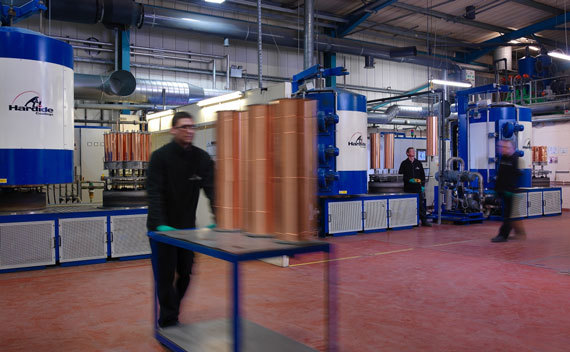More news

Preliminary tests indicate that Hardide nanostructured chemical vapour deposition (CVD) coating can extend the life of steam turbine blades through significantly enhanced resistance to water droplet erosion (WDE) and solid particle erosion.
The tests, carried out by the National Physical Laboratory (NPL) and the University of Manchester (UoM), assessed the effectiveness of the Hardide coating as protection from WDE and cracking on FV520B last stage turbine blades.
After 90hr of exposure to WDE (up to 1.2×108 water droplet impacts), Hardide-A coated 410 stainless steel samples showed almost no discernible damage in the central zone.
The uncoated 410 stainless steel samples suffered major damage with a 200microns deep scar across the sample face after a much shorter exposure of just seven hours.
Tests commissioned by Hardide Coatings’ customer EDF Energy at the University of Manchester examined the static behaviour solid particle erosion resistance of the Hardide coating on FV520B steam turbine blade material.
These yielded 0.18% weight loss for uncoated material compared to 0.04% weight loss for coated blades after 30hr of static testing.
The coating was shown to have a minimal effect on the blade’s natural frequencies; however, this effect is dependent on the coating thickness and blade design.
The results were revealed at the Institution of Mechanical Engineers’ STUG (Steam Turbine Users Group) conference in Manchester in a joint presentation by Dr Wolfgang Hahn, Commissioning Manager, Hinkley Point C (HPC) Nuclear New Build at EDF Energy, Hardide Coatings’ Technical Director, Dr Yuri Zhuk and Business Development Manager, Robin Gillham.
Dr Zhuk of Hardide Coatings commented: "Water droplet erosion and fatigue are industry-wide pressing issues and we are very pleased with these initial test results, which demonstrate the protection that the Hardide CVD coating offers against water droplet and solid particle erosion.
"Water droplet erosion damages the surface of steam and gas turbine blades, increasing turbine rotation drag and reducing efficiency.
"These tests have proven that the Hardide coating can protect the leading and trailing edges of the blades, which will increase their service life and maintain optimal turbine efficiency for longer, saving downtime and maintenance costs.”
Dr Hahn of EDF Energy said: "These preliminary tests are very encouraging and show the Hardide CVD coating offers a significant improvement for preventing material loss rates.”
EDF Energy plans to begin field testing Hardide-coated blades in the near future.
Hardide Coatings develops, manufactures and applies advanced tungsten carbide coatings to a wide range of engineering components.
Its patented technology is unique in combining, in one material, a mix of toughness and resistance to abrasion, erosion and corrosion together with the ability to coat accurately interior surfaces and complex geometries.
This enabling technology is proven to offer dramatic improvements in component life, particularly when applied to components that operate in very aggressive environments.
This results in cost savings through reduced downtime and increased operational efficiency.
Customers include leading blue chip companies operating in oil and gas exploration and production, aerospace, valve and pump manufacturing and precision engineering industries.
The company has manufacturing facilities in Oxfordshire, UK and Virginia, USA.
Hardide Coatings is a Hardide plc (AIM: HDD) group company.



